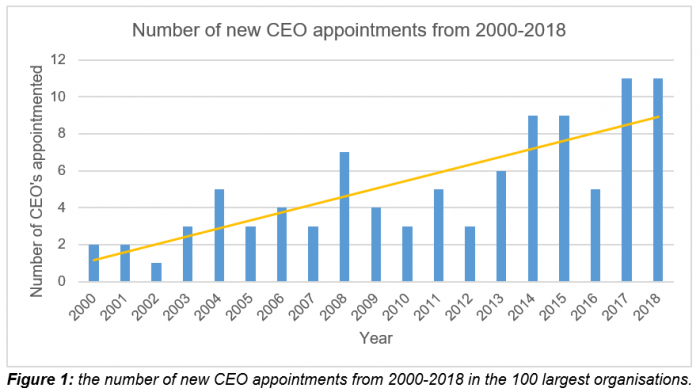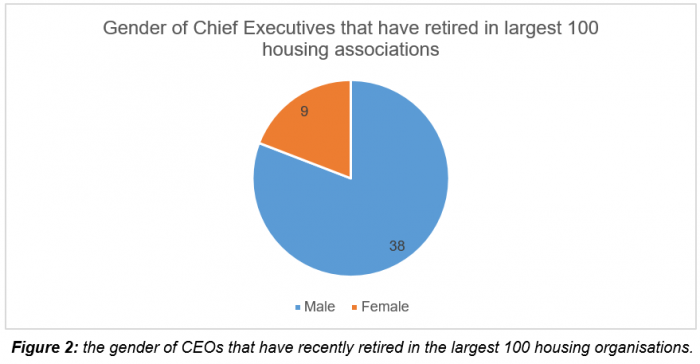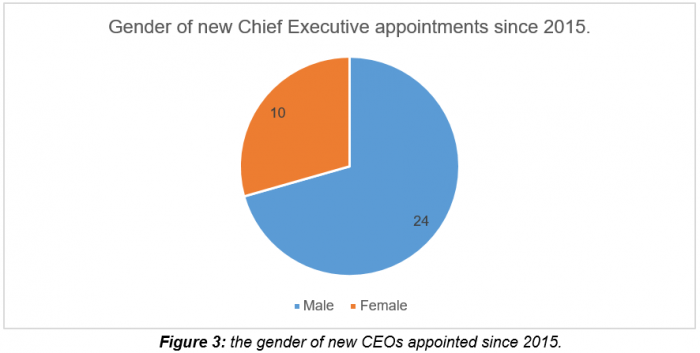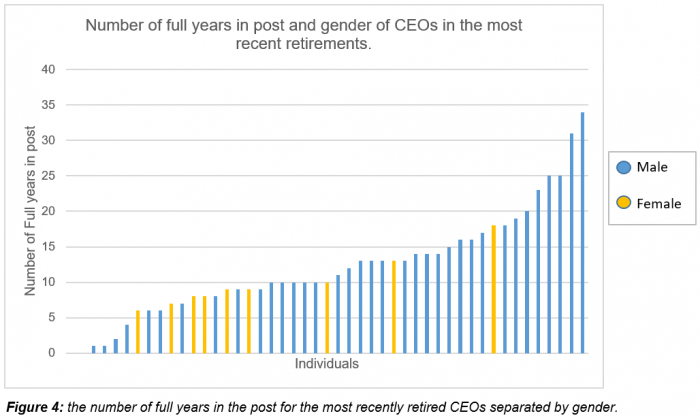Stay connected
In the past three years, 44 housing association chief executives have retired, resulting in one third of the 100 largest UK housing associations appointing a new chief executive since 2015. Inside Housing has recently conducted a study regarding the large increase in CEO retirements in the sector and investigated to what extent this has been utilised as an opportunity for the housing sector to increase diversity and inclusivity in chief executives. Figure one displays the number of new CEO’s appointed in each year from 2000 to 2018. The graph shows that in 2017 and 2018 there was a record number of new appointments with 11 new chief executives appointed in each of these years. The combined number of new appointments in 2017 to 2018 (22) was more than the combined total between 2001 and 2006 (20) showing how substantial recent CEO changes have been.
Several factors can be used to explain the large increase in recent new appointments. Firstly, 29 of the most recent CEO retirements had been in the position for 10 years or more, as shown in figure four. This is anticipated since in the early 2000s New Labour encouraged the appointment of a number of CEO positions in new housing associations and as expected, 10/15 years later these individuals are now beginning to retire. Nevertheless, other causes of recent retirements cannot be discarded. The recent rent reduction alongside the pressure to diversify, the challenges associated with technological innovation and regulation changes post Grenfell, may have played a role in the recent retirement of CEOs.
A statement from Andy Orrey, who retired as chief executive from Ongo in 2017, stated however that, “the rent reductions weren’t a factor” in his retirement. Similarly, Gordon Perry, retired chief executive from Accent Group, stated that it was his “long term plan to retire” when he did. Both of these suggest that the increase in retirements was a result of planned retirement rather than changes within the sector. It could also be suggested that those that have reached retirement age are part of the post - Cathy Come Home indignation from the 1960s and 1970s, therefore the sudden increase in retirements could be expected. The recent retirements of CEO’s in housing associations is an interesting debate. Some view the significant increase in retirement as an opportunity for the sector to diversify in terms of gender and ethnic equality, whilst others question the relationship between retirement and the recent rent reduction and sector changes.

The recent increase in retirements can be viewed as an opportunity to increase diversity, particularly as an opportunity to increase the number of female and BME CEOs in the sector. Figure 2 shows that less than 20% of those that have recently retired were female, whilst almost 30% of those that were recently appointed were female. A 10% increase in the disparity between male and female CEO’s indicates that the sector could be progressing towards improved gender equality. Another important point to highlight is that only seven of the FTSE 100 company CEO’s are women, according to the Telegraph, therefore the housing sector is arguably more diverse than average, since 10 out of the 34 new appointments of CEOs have been female, as shown in Figure three. This however does not mean that gender equality has been resolved, since boards are still dominated by white men, a point that Inside Housing have identified as being a leading cause of lack of diversity in candidates interviewed and subsequently hired.


Gender inequality is also visible in Figure four, suggesting there is a definitive disparity between gender in CEO positions. 60% of the CEOs that have recently retired had been in their position for more than 10 years, however only two of these were female. The remaining seven females to have retired had been in their position for less than 10 years. This highlights two main points. Firstly, it suggests that there has been progress in recent years in the proportion of females in the sector because since 2008 more females have retired than in the 10 years prior, suggesting that the number of female CEOs hired must have increased in order for the number of retirements to increase. Contrastingly, it also signifies that male CEOs dominate the sector since less than 20% of all retirements were female and the remaining 80% were male. These conclusions are all indicative of gender inequality existing but perhaps beginning to slowly improve. Females are establishing themselves as leaders within the housing industry, a move that is positively contributing to equality.
Pennington Choices is passionate about gender equality, with three of our eight senior leaders being women. Our Professional Services Director, Jenny Neville, stated “it is a known fact, that organisations that have women in senior leadership roles enjoy better financial performance, and it is a great shame – and lost opportunity – that women are underrepresented in the top role.” This is proven by research conducted by management consultant McKinsey, which found that companies with boards that include at least three women outperform those with no women with 66% higher return on invested capital. Jenny added: “Pennington Choices are taking further positive steps to provide gender equality in the leadership ranks and it would be interesting for Inside Housing to also conduct research on the make-up of executive leadership teams within housing providers.”

The recent retirement of CEOs presents opportunity for the housing sector. The change is an opportunity to reshape the sector, but are we likely to see progress in diversity? The answer is dependent on actions being taken now to address the imbalance in the industry. Despite uncertainty over the recent increase in retirement of chief executives, the question of how the industry will use this opportunity to improve diversity is crucial.
Chris Spencer, our People Resourcing expert, has viewed this paper as a much needed opportunity to educate the sector on the need for diversification in CEO positions. He provides recruitment services to organisations in social housing and knows what exceptional, qualified and remarkable candidates look like. We pride ourselves in being experts at recruiting underrepresented groups because we know what accomplished and qualified candidates look like, regardless of gender or ethnicity. To discuss chief executive or leadership recruitment, please get in touch today.
The Inside Housing study can be found here.
.webp?width=600&height=150&name=Pennington%20Choices%20Logo%20(reduced).webp)




